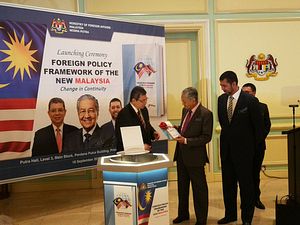On January 3, Malaysia officially confirmed that it would be reopening its embassy in North Korea. Though the move was far from surprising and specifics remain unclear, the significance of the potential development needs to be understood within the broader context of Malaysia’s ties with North Korea, Malaysia’s foreign policy under the current government, and contemporary developments affecting both sides.
Malaysia’s relationship with North Korea has historically been much more complex than the so-called “special relationship” label sometimes attached to it. Nonetheless, the diplomatic row that resulted between the two countries following the assassination of Kim Jong Un’s estranged half-brother Kim Jong-nam in February 2017 at Kuala Lumpur International Airport under the former administration of Prime Minister Najib Razak had led Malaysia to enact a series of restrictions in several realms, including closing its embassy, a travel ban, and restrictions in several realms including on workers and businesses.
But even when Malaysia’s embassy in North Korea was closed, the Malaysian government at the time indicated that this was a temporary move that might be reversed at a later date. Indeed, at the time Malaysia’s foreign ministry announced the restrictions that it did on North Korea such as a ban on citizen travel, it had clearly stated that these would be reviewed once the situation was judged to have returned to normal, thus leaving room for some flexibility and policy change.
Last week, we saw the intent to move forward with this reversal finally confirmed under the new Pakatan Harapan government which had ousted Najib’s government back in May 2018. On January 3, while speaking about Malaysia’s general foreign policy priorities for 2020, Malaysia’s foreign minister suggested that it would consider reopening its embassy in Pyongyang.
Specifically, during a press conference reflecting on the Pakatan Harapan’s foreign policy approach, Malaysian Foreign Minister Saifuddin Abdullah said that there would be an opening of the Malaysian embassy in Pyongyang following the resumption of bilateral ties with North Korea. Saifuddin cast the reopening of the embassy as part of a series of developments tied to Malaysia’s overseas posts, with others including the setting up of a Malaysian consulate general in Istanbul, Turkey.
While the development is far from surprising, it is not without significance. With respect to the bilateral relationship itself, it suggests that Malaysia-North Korea ties have finally approached a point where the more public aspects of relations can be gradually restored and also underscores how long it has taken for the two countries to move forward with such steps after the downturn back in 2017.
Beyond this, it also shows the PH government’s emphasis on Malaysia playing a role in promoting regional engagement. When Saifuddin announced the move, he notably cast it as not just being a bilateral move but as part of an effort to “motivate” North Korea to continue to pursue diplomacy and to reinforce Malaysia’s belief that such encouragement should continue, including the easing of some sanctions. This is in line with the PH government’s foreign policy approach where Malaysia sees itself as an active player in shaping regional issues where possible.
To be sure, this move is not without its risks for Malaysia’s foreign policy, especially given the bleak outlook for diplomacy as it stands now given recent indications out of Pyongyang, the difficulty of getting progress in inter-Korean ties, and the risk of increasing U.S.-North Korea tensions in 2020. And a more extensive evaluation of Malaysia’s changing approach to North Korea will only be possible once we see the specifics of the move the PH government has been suggesting, including not just the embassy reopening – for which there has not been a specific date given – but also other aspects of ties including visa policies and travel that affect the safety and security of Malaysian citizens. As this takes shape into the rest of 2020, it will continue to be important to watch.

































